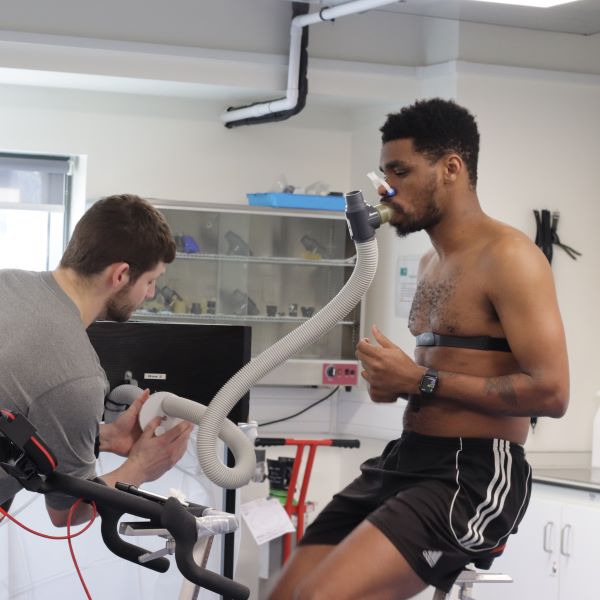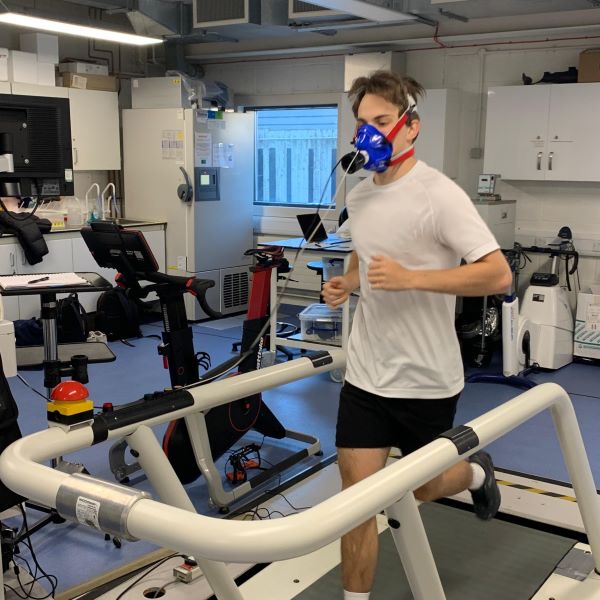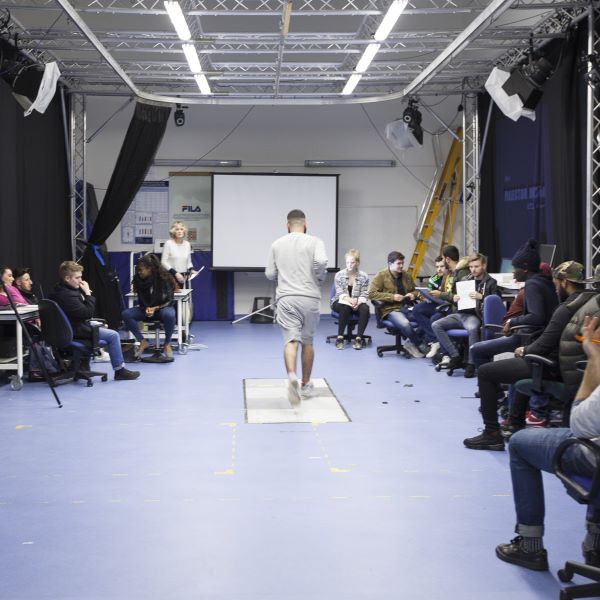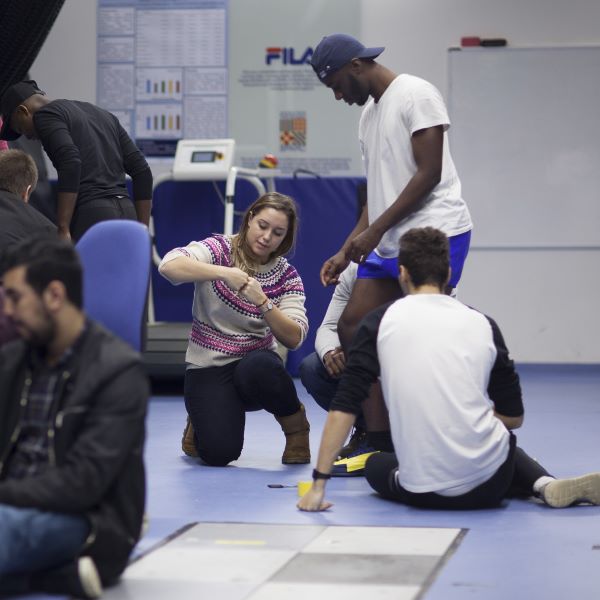You'll need:
112–128 UCAS points (or equivalent)
Foundation Year: 64–80 UCAS points (or equivalent)
International Foundation Pathway:
64 UCAS (or equivalent)
IELTS: 5.5
UCAS Code:
C602
C600 (if choosing Foundation Year)
Start date(s):
September 2026
Learn how to tackle global health and performance challenges by understanding the science of the human body, and gain the skills and professional experience you need to stand out.
In a rapidly evolving world, this programme combines practical expertise with scientific knowledge to prepare you for a wide range of careers in health, fitness, and sport.
You’ll gain a solid foundation in applying exercise, movement, and psychological principles to enhance performance, support rehabilitation, and promote lifelong well-being through approaches such as:
- Elite sport performance and coaching
- Injury prevention and rehabilitation
- Health and fitness promotion
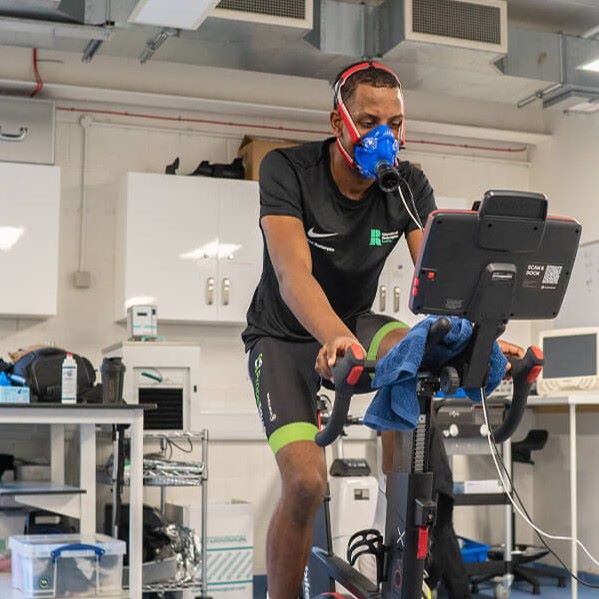
Did you know?
Our programme is endorsed by the Chartered Association of Sport and Exercise Sciences (CASES), ensuring evidence-based training and cutting-edge practice. You’ll also gain the opportunity to become a CIMSPA-qualified Gym Instructor or Personal Trainer, giving your employability a real boost.
You’ll become a confident practitioner, able to communicate effectively with athletes, clients, and colleagues across different settings.
As your skills grow, you’ll develop expertise in physiology, biomechanics, and psychology, alongside data analysis, research, and critical evaluation – everything you need to achieve your career ambitions.
Through our BSc Sport and Exercise Sciences degree, you will build a practical skill set to enhance your future career. Activities mirror real-world professional environments, meaning you’ll gain hands-on experience to support the career path you choose after your degree.
Ranked 1st for Learning Opportunities and Resources and Academic Support
(National Student Survey 2024 for Sport and Exercise Sciences)

Top 5 in London for Sports Science
(Guardian University Guide 2024)

4th in the UK for graduate prospects in Sports Science
(Times Good University Guide 2024)
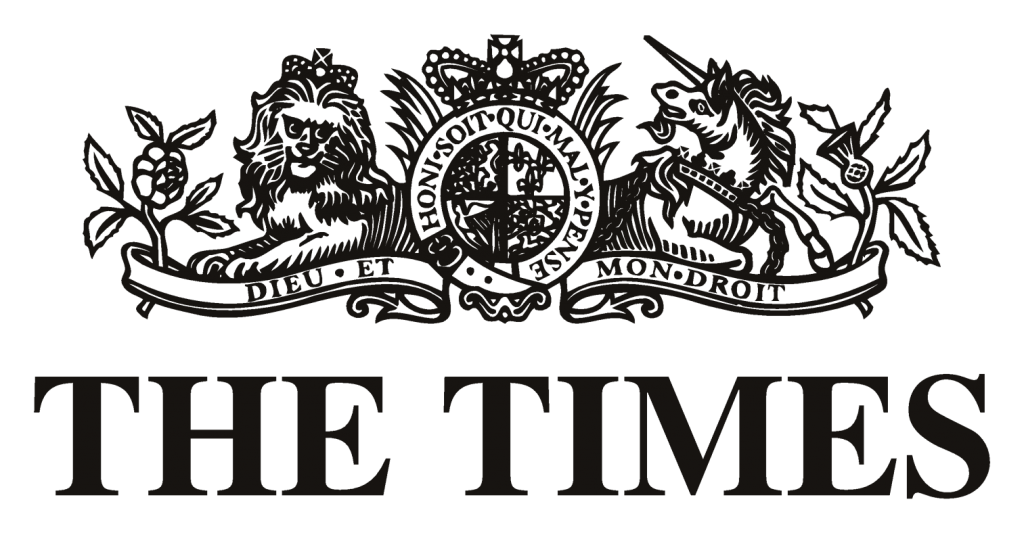
Join an accredited and recognised programme

The programme is accredited by CIMSPA, the UK's leading professional body for the sport and physical activity sector, ensuring your qualifications meet national industry standards.
It qualifies you as a Level 2 Gym Instructor and Level 3 Personal Trainer, is recognised by top gyms, enhances career prospects and credibility, and supports ongoing professional development.

The programme is endorsed by CASES, the UK's leading professional body for sport and exercise sciences, ensuring training follows evidence-based best practices.
This endorsement highlights high educational standards, boosts credibility with employers and clients, and reflects a commitment to ethical, science-backed training.
Modules
Module details: In this module, you will learn from, about, and with peers from other professional programmes, supporting interprofessional collaboration. You will develop essential academic and study skills while exploring what it means to be a professional. The module will examine key ethical, legal, and regulatory frameworks relevant to each student’s chosen discipline. Through shared learning and reflection, you will begin to build a strong professional identity within the wider context of health and social care practice.
In this module you will be introduced to the study of human biomechanics - the application of mechanical principles to understand of how people move. Why can some people jump higher than others? How can sports scientists 'see' the strengths and weaknesses of different movements? In this module you will learn how to analyse human movement using cutting edge technology to answer questions like these. The module will draw upon contemporary knowledge, research, and innovation as well as align with industry needs and demands (specifically relating to CASES requirements).
The aim of this interprofessional module is to introduce you to the key concepts and core foundations for the scientific study of life. A strong interprofessional ethos is built by bringing you and other students together and creating the opportunity to interact with and learn alongside students from a breadth of professional programmes. Subsequent modules will build on and integrate the strong foundations gained through this module to support the development of required profession specific knowledge and skills. You will develop a solid understanding of the structure and function of living organisms through the study of anatomy and physiological systems relevant to your programme of study. You will explore core physiological principles across the lifespan and, where appropriate, examine deviations from normal function, including aspects of pathophysiology.
Sport and exercise psychology is the scientific study of people and their behaviours in sport and exercise contexts and the practical application of that knowledge. As a result, this module aims to introduce you to core concepts within sport and exercise psychology and enable you to appreciate how theory, research, and practice relate to one another. A broad spectrum of both well-established and more contemporary topics will be covered, providing you with the necessary knowledge base of theory, application, and learning.
These are the current planned modules on this course and may be subject to change.
This module explores the application of psychological principles and interventions in sport and exercise settings. Building on foundational knowledge from Level 4, it enables you to critically examine how psychological theories inform practice and how interventions can be tailored to support athletes, exercisers, and teams. You will investigate key psychological constructs such as motivation, confidence, arousal, emotional regulation, and group dynamics, with an emphasis on their practical relevance. Through real-world scenarios, case studies, and group work, you will develop skills in psychological needs analysis, intervention planning, and professional communication. The module also considers ethical practice, cultural competence, and the role of the sport psychologist within interdisciplinary teams.
Information and data can sometimes be limited, sometimes overwhelming, but your ability to interpret and analyse them is an essential skill as a scientist. In this module, you will develop the critical awareness and practical skills needed to evaluate data and understand research study design. You will explore both quantitative and qualitative approaches, learn how to analyse and present data, and engage critically with scientific and non-scientific literature. These skills will support your success in Level 5 and give you a strong foundation for Level 6.
This professionally focused module equips you with a detailed understanding of exercise physiology, health screening, clinical considerations, and performance training. It prepares you to assess, monitor, and design inclusive interventions for diverse populations, from elite athletes to individuals with conditions such as cardiovascular disease, diabetes, respiratory disorders, and musculoskeletal disorders. You will explore human performance science, the pathophysiology of non-communicable diseases (NCDs), and their relationship with physical activity, alongside performance enhancement techniques such as, periodisation, for both athletic and general populations.
Successful completion of this module will make you eligible for CIMSPA qualifications including gym instructor, personal trainer, and long-term condition management.
In this module, you will further your learning of the musculoskeletal system; how the system performs to achieve movement aims and how mechanical concepts are applied to underpin our understanding. You will consider the application of biomechanics from a performance, injury and healthcare perspective and will use advanced equipment and problem-based learning simulations to achieve this.
These are the current planned modules on this course and may be subject to change.
This course offers all students the option of a one-year paid work placement, to boost your employability even further. If you choose this route, you will take the placement following year two of your course, and then return to complete your degree.
Why take a placement?
A placement year is the perfect opportunity to gain valuable work experience, to build on the career skills we will teach you on this degree. The connections you make on the placement will improve your career prospects further, and equip you with the skills you need to secure graduate-level employment.
How we support you
The University's Placement and Work Experience Team are experts at helping you to secure a placement. They will work closely with you from the start, helping you research potential employers, discover placement opportunities, create and pitch your CV, and will coach you to perform well in interviews. We aren't able to guarantee a placement, but our sector-leading advisors will give you the best possible chance of securing one.
Find out more about how we'll support you
We understand that your plans might change once you start your programme. If you decide not to do a placement, you will have the option of completing the three year version of your programme.
Whatever your choice, you will have access to many opportunities for work experience through our Placement and Work Experience Team, and access to face-to-face and 24/7 online careers support.
Key to working in Sport and Exercise Science is the ability to work using a multidisciplinary approach, therefore this module integrates the knowledge gained among the core disciplines of the Sport and Exercise Sciences in the application of scientific support in the applied setting. You will explore the physiological, psychological, and biomechanical needs of individuals, before identifying and implementing appropriate health, performance, lab, and field-based testing procedures.
Taking a novel approach this module will allow you to co-create cutting-edge Sport and Exercise Sciences topics for discussion. The topics included in the module will align to the research and applied work discussed in The Chartered Association of Sport and Exercise Sciences (CASES) publication The Sport and Exercise Scientist as well as contemporary topics that arise globally in the news.
You’ll gain invaluable vocational experience, with insights and understanding about graduate work associated with Sport and Exercise Science. Undertaking a minimum of 50 hours professional experience, plus employers talks and job application workshops will give you a competitive edge transitioning into the world of work.
This module will support you in the undertaking of your final year project. You will apply knowledge from previous learning experiences to design a project in a relevant area of sport and exercise science. You will use and develop important skills in research methods and data analysis to formulate and finalise a research question, submit an ethics application, and following approval carry out your project to completion.
These are the current planned modules on this course and may be subject to change.
This course offers a foundation year, which takes place at the beginning of your studies. Studying a foundation year will give you academic and practical experience, and a strong introduction to your subject, ensuring you succeed on your undergraduate degree.
30 credits
You will develop your core academic and integrated English language skills of speaking, listening, reading and writing. You will become familiar with key academic skills and concepts, such as referencing methods and awareness of academic integrity and tone. You will apply these skills and knowledge to both broad topics and also your chosen subject pathway.
Teaching and learning
You will be required to actively engage in on-campus learning for up to 10 hours a week.
You will be taught through a full range of teaching and learning methods, which include lectures, seminars, workshops, discussion groups, group directed tasks and presentations. This will enable you to learn from your peers and tutors in both structured and information settings.
You will be encouraged to think creatively about your approach to learning and discussions with your peers. You will also have access to recordings, resources, links and signposting through Moodle to enrich your learning.
Assessment
You will be assessed through group and individual presentations, comparative and reflective essays, multiple choice exams, coursework and reports, oral exams, portfolios, case studies and blogs.
30 credits
You will develop your core academic and integrated English language skills of speaking, listening, reading and writing. You will become familiar with key academic skills and concepts, such as referencing methods and awareness of academic integrity and tone. You will apply these skills and knowledge to both broad topics and also your chosen subject pathway.
Teaching and Learning
You will be required to actively engage in on-campus learning for up to 10 hours a week.
You will be taught through a full range of teaching and learning methods, which include lectures, seminars, workshops, discussion groups, group directed tasks and presentations. This will enable you to learn from your peers and tutors in both structured and information settings.
You will be encouraged to think creatively about your approach to learning and discussions with your peers. You will also have access to recordings, resources, links and signposting through Moodle to enrich your learning.
Assessment
You will be assessed through group and individual presentations, comparative and reflective essays, multiple choice exams, coursework and reports, oral exams, portfolios, case studies and blogs.
30 credits
You will develop your research, numeracy and information technology skills. You will investigate the difference between primary and secondary research, conduct your own research project and demonstrate your findings through data analysis. You will also develop your awareness of equality, diversion and inclusion in the UK, through a real-world issue; discrimination in the workplace.
Teaching and learning
You will be required to actively engage in on-campus learning for up to 10 hours a week.
You will be taught through a full range of teaching and learning methods, which include lectures, seminars, workshops, discussion groups, group directed tasks and presentations. This will enable you to learn from your peers and tutors in both structured and information settings.
You will be encouraged to think creatively about your approach to learning and discussions with your peers. You will also have access to recordings, resources, links and signposting through Moodle to enrich your learning.
Assessment
You will be assessed through group and individual presentations, comparative and reflective essays, multiple choice exams, coursework and reports, oral exams, portfolios, case studies and blogs.
30 credits
This module provides you with an integrated exploration of human physiology and nutrition, offering a comprehensive understanding of how the human body functions and the critical role of nutrition in supporting health and wellbeing. It examines the interplay between physiological processes and nutritional requirements, highlighting their importance in maintaining homeostasis, supporting growth, and optimizing performance.
The module begins with foundational topics, such as cellular structure, tissue types, and the anatomy and physiology of key systems, including the digestive, cardiovascular, and respiratory systems. You will then delve into the principles of energy balance, metabolism, and hormonal regulation, exploring the roles of macronutrients, vitamins, and minerals in human health.
Other key topics include fluid and electrolyte balance, the relationship between nutrition and immune function, and the nutritional demands of exercise and physical activity.
By the end of the module, you will be equipped with the foundational knowledge and practical skills necessary to apply physiological and nutritional principles to health promotion, disease prevention, and performance optimisation.
Teaching and learning
Through a combination of lectures, practical sessions, and discussions, you will develop the ability to critically analyse the integration of physiology and nutrition in promoting health. You will also gain insight into the consequences of imbalances, such as nutrient deficiencies, metabolic disorders, and the impact of malnutrition on the immune system.
The teaching delivery for each module consists of one, one-three-hour lecture and one, two-hour seminar per week. Lectures will cover core indicative content, while seminars will consist of research workshops, small group learning on relevant case studies and practical lab sessions.
You will also have an additional 30 minutes of online support each week, which will consist of formal preparation/review of lab sessions, or exam preparation (e.g. quizzes).
Assessment
This module will be assessed using an open book exam and a case study report.
50% - open book multiple choice exam, consisting of 30 questions.
50% - case study report, that explores the interaction between a physiological system and nutrition in maintaining health or contributing to disease.
30 credits
This module will explore critical aspects of research in Sports Science, Management and Therapy through methods of scientific thinking, techniques and experimental design, and will provide an opportunity to investigate the use of several techniques in all three disciplines.
You will be encouraged to explore correlational and experimental methods, the role of statistics, scientific argumentation and ethical working practices in relation to current scientific topics as reflected in news reports, recent academic publications and historical case studies. You will also be encouraged to critically debate relevant topics in sport and evaluate the need for rigorous quantitative and qualitative evidence in sports research.
You will begin with an introduction to the importance of evidence-based practice and the scientific method, progressing to an exploration of qualitative and quantitative research designs, data collection techniques, and ethical considerations. You will also gain hands-on experience with statistical analysis and the use of technological tools in sports research, such as wearable devices and performance monitoring equipment.
Teaching and learning
The module emphasises the development of professional communication skills, including scientific writing, data presentation, and effective poster presentations. Through workshops, case studies, and discussions, you will learn to identify potential biases and limitations in research, critically assess findings, and communicate results in a clear and impactful manner.
The teaching delivery for each module consists of one, one-three-hour lecture and one, two-hour seminar per week.
You will have a diverse learning experience of interactive workshops, case studies, practical exercises, group discussions, problem-based learning and guest speakers.
You will also have an additional 30 minutes of online digital support each week to enhance your understanding and learning.
Assessment
This module will be assessed using an information poster and reflections and a research proposal.
30% - informative poster, you will create a research poster that critically examines two contrasting prospectives on a chosen sports research topic.
70% - research proposal, develop a detailed research proposal on a specific sports-related topic of your choice.
These are the current planned modules on this course and may be subject to change.
Careers
A degree in Sport and Exercise Science from Roehampton equips you to shape the future of human health and performance.
We have designed our programme to give you the knowledge, skills, and confidence to succeed across the health, fitness, and sport sectors. Lifelong learning is central to the course, enabling you to reach your potential and thrive in a fast-moving, ever-evolving industry.
You’ll graduate with expertise in areas such as Exercise Physiology, Biomechanics, Sport Psychology, and research skills. With embedded qualifications with CIMSPA (i.e., Level 2 Gym Instructor and Level 3 Personal Trainer), you’ll be career-ready and able to gain valuable industry experience even before you complete your degree.
Our graduates go on to careers in health and fitness, teaching, performance analysis, rehabilitation, strength and conditioning, and many other dynamic roles in and out of the sport and exercise industry.
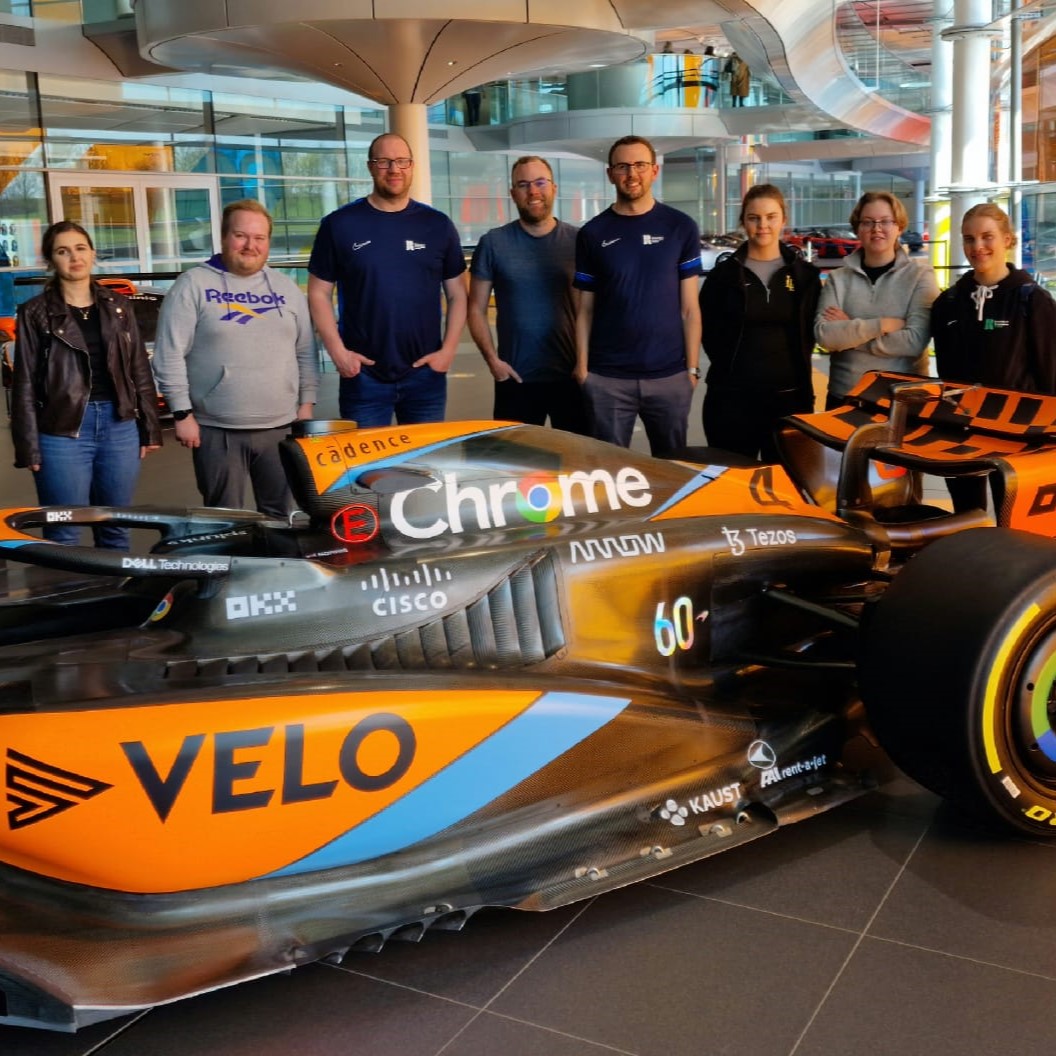
Continue with postgraduate study
You can also progress into teaching, research, or one of Roehampton’s postgraduate study options (MScs, MRes, PGCEs, or PhDs.)
The Student Futures team is here to support you throughout your time at Roehampton and beyond.
They offer services tailored to your needs, helping you take confident steps towards your future.
You’ll have access to a wide range of career workshops and events, where you can engage with employers and develop the skills you need to succeed in the workplace.
These opportunities will help you build your CV, prepare for interviews, and connect with successful Roehampton graduates who are thriving in their careers. You’ll also be able to engage with our partners across London and beyond.
Wherever you want to go in the future, you'll be preparing for the world of work from your very first day.

"The course at Roehampton has challenged me to think wider, try new tasks, and build confidence in helping others. My lecturers have given me so much support throughout the course, which I hugely appreciate, they always take time for a chat."
Siri Aastrom, BSc Sport and Exercise Sciences student
Learning & assessment
How you’ll learn
You will follow a practical, hands-on programme that blends problem-based learning, case studies, and laboratory sessions to enhance both your scientific understanding and practical skills.
You will develop the ability to design, evaluate, and monitor exercise programmes tailored to the human body, working through both individual tasks and collaborative group projects.
The modules on this programme offer a thorough foundation in physiology, biomechanics, and psychology, equipping you with the knowledge and experience to succeed in your future career.
How you’ll be assessed
You will complete a variety of assessments designed to develop both your theoretical knowledge and practical skills, including online tests, exams, laboratory reports, presentations, essays, and research projects.
In your final year, you will undertake a novel research dissertation, allowing you to focus on generating new knowledge
Hands-on learning in world-class facilities
Our Sports and Exercise Physiology facilities are designed to support practical learning and advanced research.
Based at Whitelands College, a beautiful, listed building next to Richmond Park, you’ll have access to a host of state-of-the-art facilities used by top professional athletes, including:
- Walk-in Environmental Chamber
- Human Physiology Laboratories
- Advanced Optical Motion Analysis Systems (Vicon and Peak Motus)
- Kistler Force Plates
- Motion Tracking Sensors
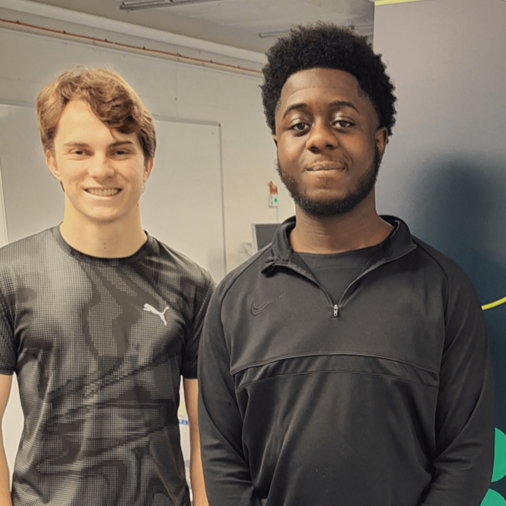
Gain real-world skills through hands-on experiences
McLaren F1 driver Oscar Piastri is one of the top sports stars who use our facilities on campus.
BSc Sport and Exercise Sciences student Jotham Yamoah was offered the chance to work with the star and wrote about the experience.
Open days
Get a real taste of our campus, community and what it’s like to study at Roehampton
Applying
Full-time UK undergraduate students apply through UCAS.
Entry tariff
112–128 UCAS points (or equivalent)
Foundation Year: 64–80 UCAS points (or equivalent)
Looking to work out your UCAS points or find out about our entry requirements? Find out more.
When we consider applications to study with us, we form a complete view of your achievements to date, and future potential, and can offer flexibility in entry requirements. Find out more about our Contextual Offer scheme.
Specific entry requirements
A-level / BTEC (or equivalent qualification) required in a science, sports science, PE or Psychology subject.
GCSE (or equivalent) requirement: Maths Grade C / 4.
General entry requirements
International undergraduate students apply through our direct application system.
Entry tariff
112–128 UCAS points (or equivalent)
International Foundation Pathway:
64 UCAS (or equivalent)
IELTS: 5.5
Looking to work out your UCAS points or find out about our entry requirements? Find out more.
When we consider applications to study with us, we form a complete view of your achievements to date, and future potential, and can offer flexibility in entry requirements. Find out more about our Contextual Offer scheme.
General entry requirements
Fees and funding
UK students
Tuition fees
| Entry date | Undergraduate Year 1 | Undergraduate Foundation Year |
|---|---|---|
| September 2026 | £9,790 | £9,790 |
Prices shown are for the first year of your degree.
Funding your studies
We also provide other ways to support the cost of living, including on-campus car parking, hardship support and some of the most affordable student accommodation and catering in London.
International students
Tuition fees
| Entry date | Undergraduate Year 1 | Undergraduate Foundation Year | International Foundation Pathway |
|---|---|---|---|
| September 2026 | £17,628 | £17,628 | £17,628 |
| January 2027 | – | – | £17,628 |
Prices shown are for the first year of your degree.
Funding your studies
We also provide other ways to support the cost of living, including on-campus car parking, hardship support and some of the most affordable student accommodation and catering in London.


